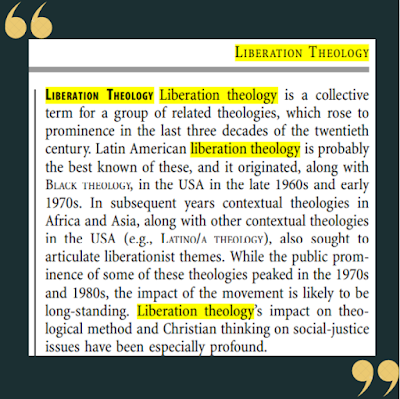 |
| excerpt from The Cambridge Dictionary of Christian Theology |
When I was growing up in Evangelicalism, the only thing I heard about Liberation Theology was that it was “not the real gospel” and that it was somehow “watering down” the “real” gospel by making it only into some kind of “social gospel.” The message I received was that the “social gospel” was no gospel at all. (Spoiler alert: I don't agree with any part of that assessment.)
If you google “what is liberation theology?” the top results, including britannica.com will tell you that liberation theology developed in Latin America in the 1960s and that it arose in the context of Catholicism out of a reaction by the local priests and laity to the poverty and social injustice in the area. Gustavo Gutiérrez was the first to use the phrase, “liberation theology” in his 1971 book: A Theology of Liberation. And this is one of the best-known forms of this theology. This book caught the attention of the Roman Catholic Church and criticized Gutiérrez for making Christianity too political. But Gutiérrez said all readings of the Bible are political.
And these ideas were not brand new. As Miguel A. De La Torre points out, this cry of resistance against oppression echoes throughout our history, from some of the early Christian writers who claimed solidarity with the poor and said wealth was a hindrance to salvation, insisting that those who were rich “had a moral obligation toward the poor,” which if ignored “bordered on idolatry” (13). Of course, they were really only pointing back to the words of Jesus in Matthew 19:24: “Again I tell you, it is easier for a camel to go through the eye of a needle than for someone who is rich to enter the kingdom of God.”
I will give more background on the Liberation Theology that came out of Latin America in a future post. For now, I just want to emphasize that it is more accurate to talk about different liberation theologies instead of just one version of liberation theology.
In the seminary course that I took on this subject, we spent time reading about not only Latin American liberation theology, but also Black liberation theology, womanist theology, queer theology, and disability theology. We can learn so much from all of these different perspectives, and we find areas of overlap and solidarity as well. In my notes from my Systematic Theology class, I wrote down:
"Theology is like a bowl of fishhooks because you try to pull out one and it’s linked to a bunch of others." - Shannon Craigo-Snell*
Works Cited and Recommended Resources
- De La Torre, Miguel A. Liberation Theology for Armchair Theologians. Louisville: Westminster John Knox Press. 2013.
- Gutiérrez, Gustavo. A Theology of Liberation. Maryknoll, N.Y.: Orbis Books, 1988.
No comments:
Post a Comment